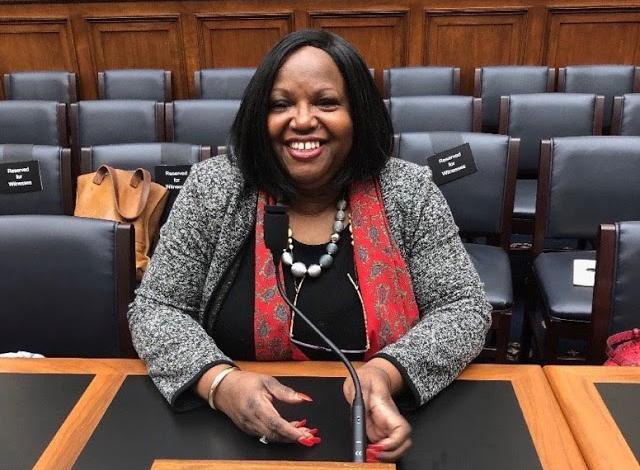
On a recent afternoon, Geraldine Collins was sitting in the community room at Phelps House discussing her recent Congressional testimony. Suddenly a woman poked her head in the door. It was a fellow tenant who didn’t like the way her new showerhead had been installed.
“Did you put in a work order?” Collins asked. “Okay, hang on, I’ll come see you in a minute.”
From speaking on Capitol Hill to heading up your building’s Tenant Association, a housing organizer’s work is never done.
Collins moved to Phelps House in 2004. Her husband was dying of cancer and his illness had drained their bank account; she had become disabled with lung disease. They had sold their brownstone on 89th Street and could no longer afford rents in the area where they had lived all their lives. As it has for so many residents, Phelps House became her refuge.
Collins helped organize the building’s Tenant Association, then became involved with housing advocacy through local groups like Tenants and Neighbors and our own Goddard Riverside Law Project. She had a way of speaking her mind, and began rising through the ranks of activists. In 2018 Collins successfully ran for president of the National Alliance of HUD Tenants, an organization representing 1.7 million residents of privately-owned, HUD multifamily housing.
She was inspired, she says, by her husband—a real estate developer who had renovated buildings and sold them to the city to rent to low- and middle-income tenants.
“My activism came from seeing how even through his sickness he was trying to preserve affordable housing, and I promised myself I would carry that forward,” she explained.
In her November testimony to the Housing, Community Development and Insurance subcommittee, Collins urged lawmakers to pass legislation empowering tenants and revamping the way HUD inspects its properties. The bills would require HUD to work with residents to monitor the condition of their buildings. “Organized tenant groups can marshal thousands of residents as unpaid volunteers—serving as the ‘eyes and ears’ of HUD—to bring our knowledge of substandard housing conditions” to the agency’s attention, she told the committee. The legislation would also empower residents to withhold their rent when living conditions become substandard, and allow tenants to sue for better conditions.
In her national advocacy and her role at Phelps House, Collins emphasizes teamwork. “My thing is to meet with management and see if we can solve it,” she explained. “I’ve always told the tenants to work with management, not yell and scream.”
Collins often cites Phelps House as a shining example of what HUD housing should be. While quality may vary, she told lawmakers that “most HUD and public housing developments provide safe, decent and affordable homes.” What keeps her up at night is the substandard buildings —some of which she toured in a visit to Chicago, Atlanta and Florida. “You can look up into the ceiling and see the sky,” she recalled. “You see the rat infestations, the mold, the mildew, the lead paint. It made me more committed to the cause.”
What energizes her is progress. “I have people who come back and say thanks for pushing the issues—the boiler got fixed, they redid the apartment, they got rid of the mold,” she said.
“The way people are living is not right. If I can help end some of this, I’ll keep going.”
Photo: Geraldine Collins on Capitol Hill